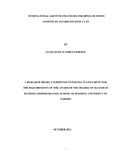| dc.contributor.author | Njoroge, Jacqueline W | |
| dc.date.accessioned | 2013-03-12T09:38:41Z | |
| dc.date.issued | 2012 | |
| dc.identifier.citation | MBA Thesis 2012 | en |
| dc.identifier.uri | http://erepository.uonbi.ac.ke:8080/xmlui/handle/123456789/13512 | |
| dc.description | Master Thesis | en |
| dc.description.abstract | Firms in dynamic industries respond to environmental changes and competitive forces in
different ways so as to maintain a strategic fit between the environment and their
operations. Some improve current products, diversify and divest, while others employ
techniques that ensure operational effectiveness. Safaricom launched M-PESA in 2007
which is a transformative mobile banking service launched by Vodafone in partnership
with safaricom. The concept of M-PESA is based on branchless banking service,
meaning that it is designed to enable users to complete basic banking transactions without
the need to visit a bank branch. The objective of the study was to determine the
international growth strategies for M-PESA business adopted by Safaricom Kenya Ltd.
The study applied a case study design. The study made use of both primary and
secondary data. Primary data was collected through face to face interview with six senior
managers while secondary data was collected through review of the contents of various
relevant publications and reports, Financial Statements and other relevant materials. The
respondents comprised of six senior managers representing the six business support
departments because of their key role in strategy formulation and implementation of
strategy to reduce chances of data redundancy. The data obtained was analyzed using
content analysis. The study established that the drivers for growing the M-Pesa business
internationally included the need to expand the market for the service since the service
was technology bases and create diversity in revenue sources for the Company; the
gradually growing competition in the local market as other service providers continued to
launch their mobile based money transfer services; to create a convenient and cost
effective way sending money from the UK to Kenya for the migrants to UK; the hosting
of the M-Pesa servers in the UK. The growth strategies chosen by the Company were
very effective considering the fact that there existed a ready market for the international
M-Pesa service in UK. The study concluded that Safaricom used market penetration
strategy which involved the same services of M-Pesa being pushed into the same largest
consumer group of Kenyans in the United Kingdom market. The study further concluded
that Safaricom limited used market development strategies in the launching of
international money transfer services. The service had initially been designed to cover the
Kenyan market. | en |
| dc.description.sponsorship | University of Nairobi | en |
| dc.language.iso | en | en |
| dc.title | International growth strategies for Mpesa business adopted by Safaricom Kenya Ltd | en |
| dc.type | Thesis | en |
| local.publisher | School of Business, University of Nairobi | en |

